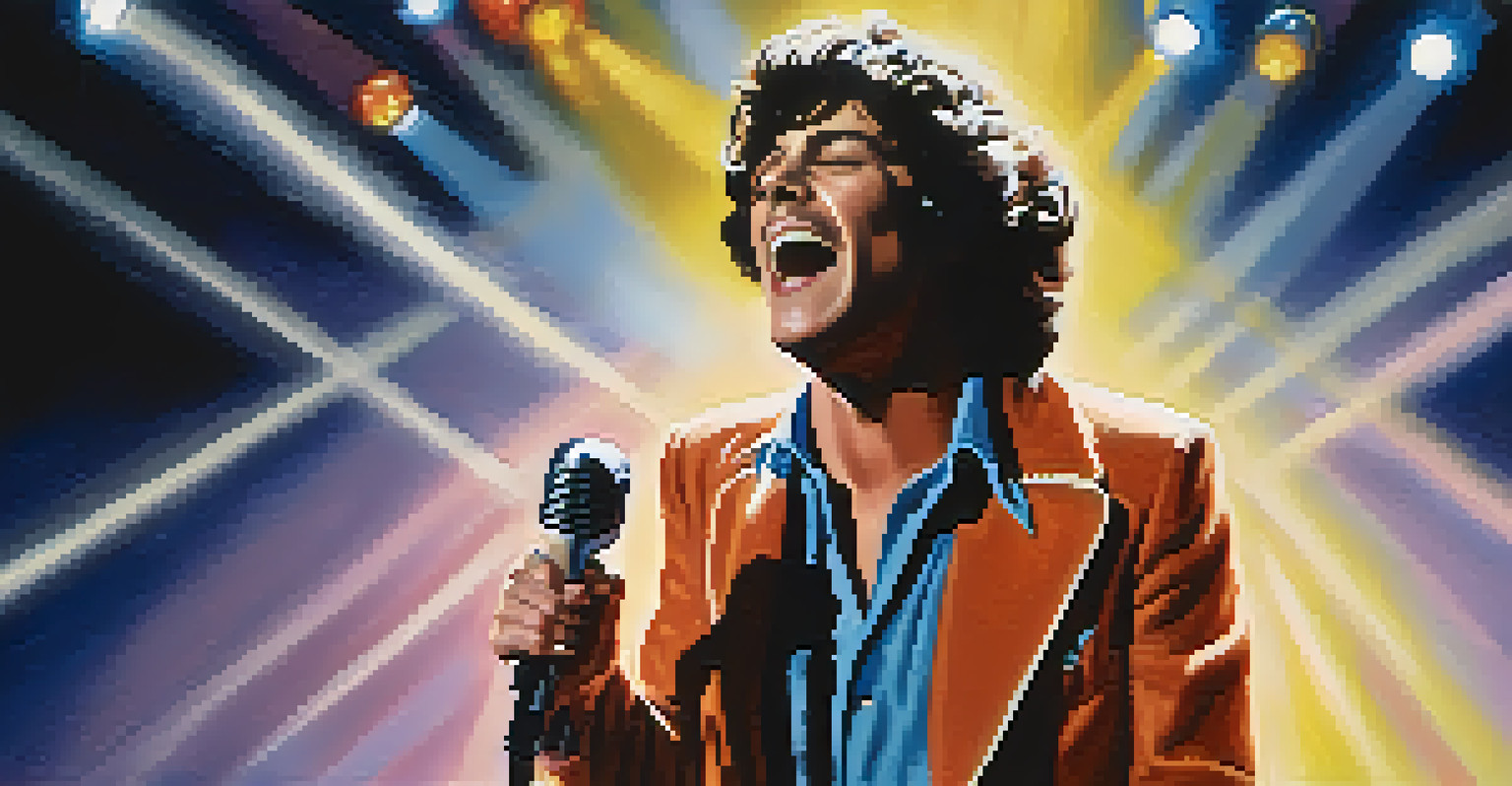The Role of Music in Biopics: Enhancing Emotional Impact

Understanding the Importance of Music in Film Narratives
Music plays a crucial role in film, shaping the viewer's experience and emotional response. In biopics, where real-life stories are told, the right soundtrack can elevate the narrative, making it more relatable and poignant. Think of music as the emotional undercurrent that guides the audience, enhancing moments of joy, sorrow, or tension.
Music can change the world because it can change people.
For instance, in the biopic 'Bohemian Rhapsody,' the iconic Queen songs not only showcase the band's evolution but also resonate deeply with the audience's feelings about fame and personal struggle. The music acts as a bridge between the characters' experiences and the viewers' emotions, creating a shared connection.
By weaving together narrative and melody, filmmakers can leave a lasting impression, ensuring that the audience doesn't just watch the story but feels it. This synergy between music and storytelling is what makes biopics memorable.
Setting the Tone: How Music Establishes Mood
The tone of a biopic is often set by its music, which can influence how audiences perceive characters and events. A somber piano piece can signal tragedy, while an upbeat rock song might introduce a moment of triumph. This auditory cue is essential for guiding viewers' emotional journeys throughout the film.

For example, in 'The Pursuit of Happyness,' the uplifting score plays a vital role in portraying the protagonist's resilience despite overwhelming odds. Each note reinforces the hope and determination that define the story, making the viewer root for the character even more fervently.
Music Enhances Emotional Connection
In biopics, music acts as an emotional undercurrent, deepening the viewer's connection to the characters and their journeys.
Ultimately, music not only complements the visual elements but also amplifies emotional highs and lows, allowing audiences to immerse themselves fully in the biographical narratives.
Music as a Storytelling Device in Biopics
In many biopics, music serves as a storytelling device that progresses the narrative or reveals character development. Songs can highlight pivotal moments or reflect a character's inner thoughts, acting as a narrative thread that ties the film together. This technique allows filmmakers to convey deeper meanings without relying solely on dialogue.
The music is the background of the film. It connects everything together.
Take 'A Star is Born' as an example, where original songs reflect the emotional state of the characters and their evolving relationship. The music becomes a character in its own right, illustrating their struggles and triumphs in a way that dialogue alone cannot achieve.
This relationship between music and storytelling enriches the viewing experience, allowing audiences to connect with the characters on a more profound level.
Cultural Context: Music Reflecting Time and Place
Biopics often depict specific historical periods, and music can provide a cultural backdrop that enhances authenticity. By incorporating songs that were popular during the time the story is set, filmmakers create a sense of place that transports viewers back in time. This cultural context adds layers to the narrative, making it more relatable.
For instance, 'Selma' features music that resonates with the Civil Rights Movement, using both contemporary and period-specific songs to underscore the gravity of the events. This careful selection helps the audience understand the emotional and social climate of the time.
Original Scores Elevate Storytelling
Custom-composed scores can encapsulate the emotional essence of a biopic, enhancing the narrative and making key moments more impactful.
Thus, music not only enriches the story but also serves as a historical anchor, helping viewers to connect with the realities of the characters' experiences.
The Power of Original Scores in Biographical Films
While existing songs are impactful, original scores crafted specifically for biopics can have an equally powerful effect. These scores often encapsulate the emotional essence of the film, providing a unique auditory landscape that enhances the narrative. Composers carefully design themes that resonate with the story's core messages and character arcs.
For example, 'The Theory of Everything' features a score that beautifully mirrors the emotional journey of Stephen Hawking, with delicate melodies that reflect both his brilliance and struggles. The music guides the viewer through the highs and lows of his life, creating a profound connection to his character.
In essence, original scores can elevate the storytelling, making moments more memorable and impactful.
Emotional Resonance: Creating Memorable Moments
One of the most significant roles of music in biopics is creating moments that resonate emotionally with viewers. Powerful scenes paired with the right music can evoke tears, laughter, or a sense of nostalgia, leaving a lasting impression long after the credits roll. These moments are often the ones that audiences remember most vividly.
A prime example is in 'Rocketman,' where the song 'I'm Still Standing' becomes a triumphant anthem for Elton John's comeback. The emotional weight of the scene, combined with the energetic music, creates a euphoric moment that encapsulates the spirit of resilience.
Soundtracks Influence Film Reception
Memorable soundtracks not only boost audience engagement but also contribute to a biopic's popularity and lasting legacy.
By crafting these emotional peaks, music becomes a catalyst for audience engagement, deepening their connection to the story and characters.
The Lasting Impact of Music on Biopic Reception
The music in biopics not only enhances the storytelling but can also significantly influence the film's reception. Memorable soundtracks often lead to increased audience engagement and can even boost the film's popularity. When audiences connect with the music, they are more likely to revisit the film and share their experiences with others.
Consider the success of the soundtrack for 'The Greatest Showman,' which became a cultural phenomenon, drawing people to the film and sparking discussions about its themes. The music's impact extended beyond the screen, influencing the film's legacy and reaching audiences who may not have seen it otherwise.

In this way, music becomes a powerful marketing tool, contributing to a biopic's success and ensuring its place in cinematic history.